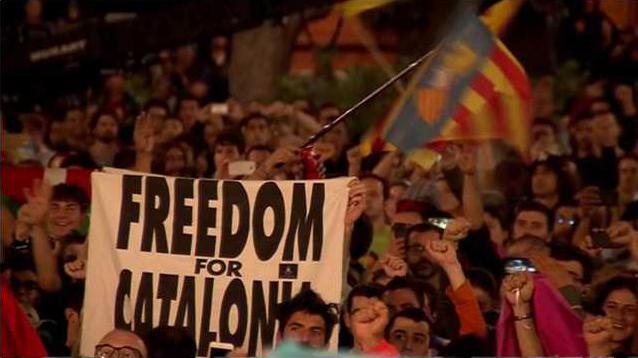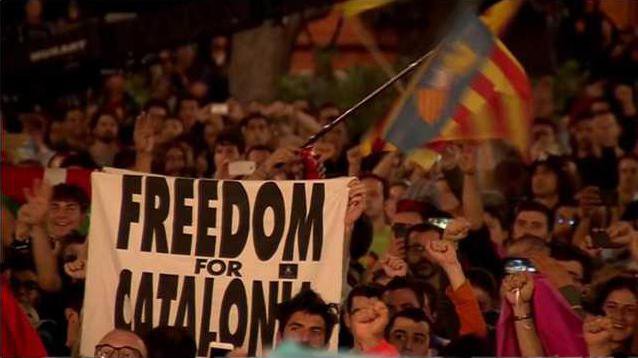Rising tensions between the regional government of Catalonia and Spain boiled over this weekend and into the week.
Voters in Catalonia, a region with its own distinct language and culture, approved an independence referendum on Sunday. Spain has protested the movie, which has ignited tension.
Heres a quick breakdown of what you should know.
The vote: About 42 percent voted in favor of the move, according to BBC News.
Ninety percent of the 2.3 million voters approved the move, according to The New York Times
Spains reaction: The Spanish government did not recognize the move, calling it illegal, according to The Telegraph.
Even before the voting took place, the Spanish police blocked off voting stations and engaged in physical violence with protesters to ward off the move. More than 900 people were injured by police, the BBC reported.
Catalonias declaration: On Sunday, Catalan leader Carles Puigdemont said voters backed the decision and would move for independence, according to BBC.
"With this day of hope and suffering, the citizens of Catalonia have won the right to an independent state in the form of a republic," Puigdemont said on Sunday.
Puigdemont has yet to declare full independence from Spain.
Protests: Barcelona's streets were filled with protesters on Tuesday, as Catalans expressed anger of Spains violent crackdown on voting, according to CNN. The city closed down shops, schools stopped classes, and public transportation cut back schedules all for the sake of protesting.
"The streets will always be ours," protesters chanted.
Call for help: Catalonia called for the European Union to help it gain independence, Quartz reported.
There is no button to push for independence, it does not exist, Puigdemont said, according to The Guardian. It is not a domestic matter. Its obvious that we need mediation. We dont want a traumatic break. We want a new understanding with the Spanish state.
European Union: According to The Washington Post, the European Union saw the independence referendum as a violation of Spanish law, and worried about how the move would affect relations between Spain and Catalonia.
Next moves: Protesters will continue to march against the Spanish government, according to The New York Times.
Spain may take measures into its own hands now, The Washington Post reported. Spanish Justice Minister Rafael Catal said that the constitution of Spain gives the country the right to intervene and run a region, like Catalonia, if they declare independence.
If somebody tries to declare the independence of part of the territory something that cannot be done we will have to do everything possible to apply the law, Catal said.
Voters in Catalonia, a region with its own distinct language and culture, approved an independence referendum on Sunday. Spain has protested the movie, which has ignited tension.
Heres a quick breakdown of what you should know.
The vote: About 42 percent voted in favor of the move, according to BBC News.
Ninety percent of the 2.3 million voters approved the move, according to The New York Times
Spains reaction: The Spanish government did not recognize the move, calling it illegal, according to The Telegraph.
Even before the voting took place, the Spanish police blocked off voting stations and engaged in physical violence with protesters to ward off the move. More than 900 people were injured by police, the BBC reported.
Catalonias declaration: On Sunday, Catalan leader Carles Puigdemont said voters backed the decision and would move for independence, according to BBC.
"With this day of hope and suffering, the citizens of Catalonia have won the right to an independent state in the form of a republic," Puigdemont said on Sunday.
Puigdemont has yet to declare full independence from Spain.
Protests: Barcelona's streets were filled with protesters on Tuesday, as Catalans expressed anger of Spains violent crackdown on voting, according to CNN. The city closed down shops, schools stopped classes, and public transportation cut back schedules all for the sake of protesting.
"The streets will always be ours," protesters chanted.
Call for help: Catalonia called for the European Union to help it gain independence, Quartz reported.
There is no button to push for independence, it does not exist, Puigdemont said, according to The Guardian. It is not a domestic matter. Its obvious that we need mediation. We dont want a traumatic break. We want a new understanding with the Spanish state.
European Union: According to The Washington Post, the European Union saw the independence referendum as a violation of Spanish law, and worried about how the move would affect relations between Spain and Catalonia.
Next moves: Protesters will continue to march against the Spanish government, according to The New York Times.
Spain may take measures into its own hands now, The Washington Post reported. Spanish Justice Minister Rafael Catal said that the constitution of Spain gives the country the right to intervene and run a region, like Catalonia, if they declare independence.
If somebody tries to declare the independence of part of the territory something that cannot be done we will have to do everything possible to apply the law, Catal said.








